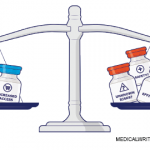SAN DIEGO—Should patients with rheumatic diseases switch from a biologic to its biosimilar? At the 2017 ACR/ARHP Annual Meeting’s Great Debate, held Nov. 5, two rheumatologists argued whether to switch or stay put based on safety, efficacy and potential cost savings.
First to the podium to make the case for switching, Jonathan Kay, MD, tweaked Shakespeare’s Hamlet: “To switch or not to switch, that is the question! Whether ’tis better for bones and joints to suffer the stings and burden of outrageous prices, or try changing to a biosimilar and, by converting, save costs. That is the question,” said Dr. Kay, professor of medicine at the University of Massachusetts Medical School in North Worcester. “The data support that it is safe, effective and cost effective to switch to a biosimilar.”
Rigorous Approval
Biosimilars approved in the U.S., such as infliximab-dyyb (Inflectra), adalimumab-atto (Amjevita), adalimumab-adbm (Cytelzo) and etanercept-szzs (Erelzi), go through an abbreviated development process, which decreases cost. These drugs are still required to meet rigorous standards and complete extensive comparisons with their reference product, or bio-originators, for approval, he said.
All biologic products may vary from batch to batch due to small changes in the manufacturing process or such factors as oxidation, Dr. Kay noted.1 As long as any variation is within proved, acceptable ranges for critical quality attributes, these products are approved and pose no safety or efficacy risks. One 2011 study showed changes in batches of both etanercept and rituximab after shifts in manufacturing processes over a four-year period.2 Despite these differences, the products were within acceptable ranges of variation, so no label changes or further analytic data studies were required.
Manufacturing variability may make one batch of a reference biologic essentially a biosimilar of another batch, said Dr. Kay. A biosimilar must demonstrate similar safety and efficacy in comparison to its reference product, but “there is no need to demonstrate efficacy in all indications, because we have extensive clinical experience with the reference product. No differences are expected in purity or safety between an approved biosimilar and its reference product.”
Comparable Safety & Efficacy
It’s safe and effective for patients to switch to a biosimilar, said Dr. Kay, citing several studies from Europe.
In a 52-week trial from Norway, 482 patients with six different inflammatory conditions—RA, psoriatic arthritis, psoriasis, Crohn’s disease, ulcerative colitis and spondyloarthritis—who were stable on infliximab were divided into a maintenance therapy group and a group switched to the biosimilar, infliximab-dyyb.3 Averaging across all six indications, treatment responses in the biosimilar group fell within the study’s 15% margin of non-inferiority to the bio-originator. The study also showed similar immunogenicity, or the development of anti-drug antibodies, in both groups, Dr. Kay said.



